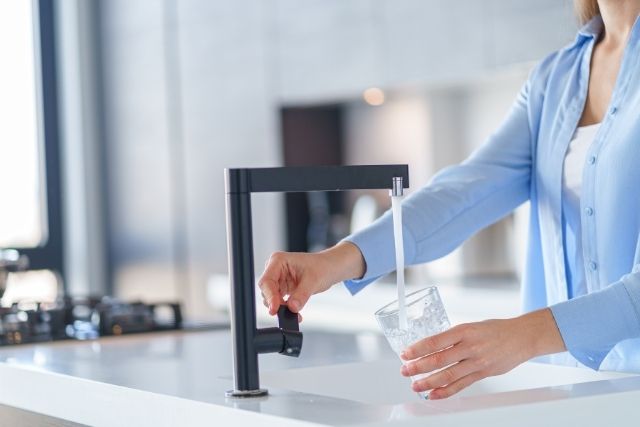How Does a Water Filtration System Work?

Everyone wants to know the water they’re drinking is clean and safe. Water filtration systems are intended to enhance water quality by removing extra minerals and other contaminants. These systems also provide advantages such as longer-lasting, softer laundry; more efficient household appliances; and cleaner bathing water. If you’re interested in learning more about the water filtration process, read on to answer the question, “How does a water filtration system work?”.
What Is a Water Filtration System?
There are several distinct types of water filtration systems, but each one serves the same primary purpose: to supply your household or business with clean drinking water. Water filtration systems capture impurities in the water and enable only clean water to pass through. Some systems use microscopic pores to filter out even the tiniest bacteria while still allowing water to pass through. They accomplish this using a reverse osmosis thin-film composite membrane. Others scrub the water clean with materials such as activated carbon or sand. Here are a few examples of how different types of filters work:
Carbon Filters
There are two main types of carbon filters that use granular activated carbon or block carbon. Due to their slightly positive charge, activated and block carbon can both attract contaminants. These filters work by passing tap water through a positively charged, highly absorbent charcoal filter that employs adsorption to remove contaminants. Pollutants in the water become trapped inside the charcoal filter’s microscopic pores.
Deionization and Ion Exchange Filters
These filters extract or exchange undesirable ions such as heavy metals with ions such as sodium. Inorganic chemicals as well as salt, calcium, and magnesium are removed through this process.
Reverse Osmosis Filters
Tap water is forced through a semipermeable membrane with high water pressure to prevent any particles bigger than water molecules from going through. Additional tap water flushes away the residue retained by the membrane.
Why You Need Water Filtration Systems
Water filtration systems purify water by removing contaminants. Clean water is important for your health when you’re drinking, showering, cooking, and more. A water filtration system can be especially crucial when you’re living in San Antonio. San Antonio and the surrounding areas get their water from the Edwards Aquifer. This source is filled with limestone, which leaves dissolved minerals in the water supply and causes what’s known as hard water—water filtration systems can separate these minerals out.
Hopefully, this has clarified how a water filtration system works for you. Allow the professionals at Alamo Water Softeners to assist you with water filtration systems in San Antonio. We are the area’s most reputed and reliable water softening company, offering the greatest value for high-quality water treatment. Contact us today with any questions about our products and services.


